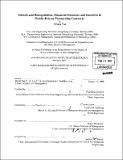Default and renegotiation : financial structure and incentive in public-private partnership contracts
Author(s)
Tsai, I-Tsung, 1970-
DownloadFull printable version (6.745Mb)
Alternative title
Financial structure and incentive in public-private partnership contracts
Other Contributors
Massachusetts Institute of Technology. Dept. of Civil and Environmental Engineering.
Advisor
Fred Moavenzadeh and Gordon M. Kaufman.
Terms of use
Metadata
Show full item recordAbstract
This research explores the functional relationship between financial structure and agent's cost-reducing effort in the realm of public-private-partnership (PPP) contracting. I consider a canonical contracting problem where incomplete financial provisions are used to govern the execution of a project that involves uncertain cost. The existing literature shows that debt (as opposed to external equity) is the better financing alternative in terms of effort induction. I show, on the other hand, that internal equity (as opposed to debt) is the better financing alternative for effort induction when the parties are allowed to achieve ex post Pareto improvement through self-enforcement, renegotiation, and replacement. Under the assumptions that the consumer surplus is always greater than the realized cost, and that the social cost of public funds (the tax rate) is greater than the private agent's cost of capital, I show that: (1) Ex ante capital structure and control rights regime jointly determine the equilibrium game form of the contract (the agent's effort level and the uncertainty of cost don't matter). (2) The agent's optimal cost-reducing effort is determined by a hold-up factor and a self-enforcement factor. The former is a strict disincentive to the agent's effort, whereas the latter can be an incentive or a disincentive to the agent's effort depending on the capital structure of the contract. (Cont.) (3) For any given initial capital investment, the agent's optimal cost-reducing effort decreases with the magnitude of debt. (4) For any given initial capital investment, the agent's optimal cost-reducing effort increases with the magnitude of a performance bond when the contract is one with no positive self-enforcement effect. The theoretical result is consistent with the conventional wisdom that internal equity and performance bond generally enhance the agent's devotion to a PPP contractual relationship. This research also contributes a (subjective) PPP contract valuation method that takes into account the underlying agency problem.
Description
Thesis (Ph. D.)--Massachusetts Institute of Technology, Dept. of Civil and Environmental Engineering, 2007. Includes bibliographical references (p. 98-102).
Date issued
2007Department
Massachusetts Institute of Technology. Department of Civil and Environmental EngineeringPublisher
Massachusetts Institute of Technology
Keywords
Civil and Environmental Engineering.